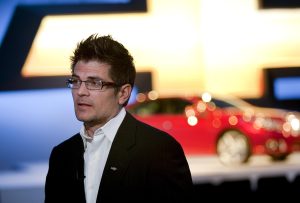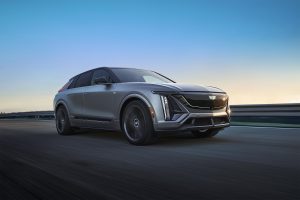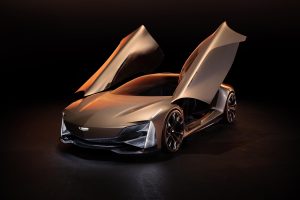If you want job security, it seems, you might hope to land the role as General Motors’ head of design. There’ve only been seven people to hold that position over the last century. But that exclusive club will soon grow to eight as Michael Simcoe steps down and hands his pens to GM veteran Bryan Nesbitt. Here’s more on the transition.
Micheal Simcoe is stepping down as General Motors’ senior vice president of global design, a position he has held since 2016. He will be succeeded by Bryan Nesbitt, currently the design chief for GM’s Cadillac brand, effective July 1.
Such a transition is rare at GM. There have, until now, been just seven people to helm the automaker’s design department since the legendary Harley Earle created the original Design and Color studio in 1927.
The 67-year-old Simcoe was praised by GM President Mark Reuss for elevating the automaker’s designs “the world over.”
“Under his leadership,” Reuss added, “GM Design has created a stunning vehicle portfolio that customers love. His focus on the customer, keen eye for detail and an emphasis on the future made Michael everything we could have asked for in a chief designer.”
Guiding GM through a critical transition
Simcoe has spent 42 years working with GM, joining the automaker in 1983 through its Holden operations in Australia. He became the lead designer there four years later before moving onto senior positions in Asia, and then North America where he oversaw exterior design. He was elevated to international design director before taking on his current role, adding the title of senior vice president in 2023. He was the first non-American to take the lead design role.
Like his immediate predecessor, Ed Welburn, Simcoe faced some critical challenges. For some time, GM had allowed its once-vaunted design leadership fade with products like the much-ridiculed Pontiac Aztek. After losing sizable amounts of market share, the automaker entered the new millennium once again positioning design as a key competitive advantage.
Simcoe can point to a number of well-respected production models and concept vehicles that bore his imprint, including the Buick LaCrosse, Cadillac CTS and Chevrolet Camaro. He has covered the full extreme from a price perspective, from the entry-level Chevy Trax to the $300,000, hand-built Cadillac Celestiq.
He also helped GM begin its transition to battery power with vehicles such as the Chevrolet Blazer EV and Caddy Lyriq.
“Michael and his team have cemented design as a fundamental competitive advantage for GM,” said Reuss.
More GM Design News
- Cadillac Still Wants a Hypercar. Will GM Approve it?
- GM Designs Strut Their Stuff at the Pebble Beach Concours
- Cadillac Opulent Velocity Concept Balances Design, Performance, Technology

As Chevrolet Executive Director Exterior Design Bryan Nesbitt talked with reporters after the debut of the Chevrolet Malibu in 2013.
The rising star
At 55, Bryan Nesbitt is likely best known for work he did at one of GM’s domestic competitors: the quirky little Chrysler PT Cruiser. He took the idea with him when he moved to GM in 2001 the form of the Chevy HHR.
Nesbitt spent several years “across the pond” as Executive Director of GM Europe Design before returning as General Motors Vice-President of Design for North America. Directly reporting to Welburn and then Simcoe, he oversaw design for international brands such as Opel, Vauxhall and Saab, as well as GM’s North American-based Chevrolet, Cadillac, Buick, Pontiac, Saab, Saturn, GMC, and Hummer.
Like Simcoe, he has played a critical role in the transition to EVs, taking lead in projects such as the Cadillac Opulent Velocity and Solei concepts.
“Under Bryan’s leadership, I know GM Design will continue to drive the company forward,” Simcoe said of his successor. “He shares my belief in our team’s creative talent and their potential, and I’m excited to see how the next generation of GM Design influences the automotive landscape.”







Any Detroit design chief should be ashamed of the title. We haven’t seen an original design in 50 years.